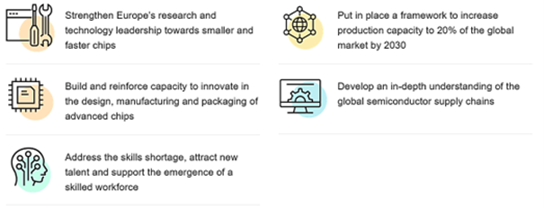INFORMAÇÃO
Por favor, aguarde...


Pedido submetido com sucesso.



The aim of the proposed Regulation is to strengthen the European semiconductor ecosystem, increase the security of supply of semiconductors in the EU and develop new markets for leading-edge European technologies.
On February 8th, 2022 the European Commission published the proposed European Chips Act, which aims to ensure that, by 2030, chip availability represents 20% of global production. The European Chips Act will mobilise over 43 billion euros in public and private investment.

Portugal, through ANI and the Directorate General of Economic Activities of the Ministry of Economic Affairs and Sea (DGAE/MES), will be represented in the European Semiconductor Expert Group, created by the European Commission with the purpose of advancing coordination activities with member states.
In this package, the Commission adopted a communication, outlining the grounds and overall strategy, a proposal for a regulation to be adopted by the co-legislators, a proposal for changes to the Council Regulation establishing the Key Digital Technologies Joint Undertaking (KDT JU), and a recommendation to Member States promoting actions to monitor and mitigate disruptions in the semiconductor supply chain.
The KDT JU European Partnership is an institutionalised partnership in which Portugal participates and where R&I projects are leveraged at a European level.
To complement the proposed package, on May 11th 2022, the Commission published the Staff Working Document (SWD), which aims to explain why Europe needs to act to fill the shortage in design and manufacturing skills and facilities essential to ensure its resilience against disruptions in the semiconductor supply chain.
SCOPE - THE PROPOSAL FOR THE EUROPEAN CHIPS ACT

STRUCTURE - THE PROPOSAL IS BASED ON THREE PILLARS OF GOVERNANCE

Pillar I - Chips for EU Initiative aims to strengthen the EU R&I's capacity by promoting lab-to-fab and supporting SMEs and start-ups to scale their businesses;
Pillar II - Security of Supply, which will promote security of supply by creating a framework that attracts investment and advanced production capacity through first-of-a-kind integrated production facilities (Integrated Production Facilities IPF) and open foundries (Open EU Foundry - OEF);
Pillar III - Preparedness & Monitoring represents the coordination mechanism between Member States (MS) and the European Commission to strengthen collaboration, monitor supply, estimate demand, and anticipate and react to crisis situations.
BUDGET & INSTRUMENTS
The European Commission proposes funding as follows:
The EU budget will be complemented with 5.3 billion euros from Member States (MS) and 4.65 billion euros from the private sector.
One of the major initiatives in support of the whole European Chips Act will be the Important Projects of Common European Interest (IPCEI), i.e. large-scale projects involving more than one Member State and representing a significant benefit for achieving one or more EU industrial policy objectives. The European Commission anticipates that MS will invest around 30 billion euros in IPCEI in this area. In 2018, the first IPCEI in the area of microelectronics was approved (with 5 MS). Preparatory work started in the second half of 2020 for the notification to COM of a second IPCEI (with 20 MS) to support the microelectronics and communication technologies sector.
CALENDAR

At national level, ANI and the Foundation for Science and Technology (FCT), in close coordination with the Directorate General of Economic Activities of the Ministry of Economic Affairs and Sea (DGAE/MEM) follow and support the discussions on the regulation of the European Chips Act.
With the launch of the Chips Act proposal, discussions at the level of the Council of the European Union and the draft regulation have undergone several amendments proposed by Member States.
At the meeting of the COMPET Council, Internal Market and Industry strand, on December 1st 2022, the Ministers responsible for Industry in the different Member States are invited to endorse the Global Approach on the Commission's proposal, based on the commitment text in the Annex and available HERE; and approve the statement in the Agenda and which will be attached to the minutes of the meeting.
Trilogues between the Commission, the Council and the European Parliament will start in early 2023 to reach the final version of the proposal for the European Chips Act regulation.
Find out more about the project here.